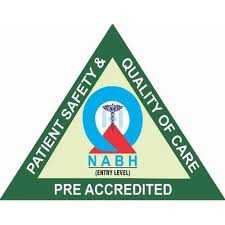Cataract Surgery & IOL
Safe, painless, advanced technology to restore natural vision
Have Any Query?
Enter Your Mobile Number For Call back
Why Choose us
We are one of Delhi NCR’s leading
eye centres for cataract surgery in Noida and IOL implantation. Dr Ritu Aurora,
The head of Cataract Services has more than 25 years of experience with one of the
safest and gentlest hands in the industry. So much so that other doctors bring
their elderly parents to be operated by her!
Vision Plus Eye Centre is equipped
with the latest technology to give excellent results for our patients. Our
Advanced Operation theatre with Hepa filter, laminar airflow and Sterilization
techniques ensure an infection-free environment that is critical for eye surgery. Our operation theatre is also equipped with Zeiss Lumera I operating
microscope, a Sony recording system and the Alcon Centurion Gold vision system
with Ozil from the. USA, as well as the Constellation, a high performance
Venturi system. This means world-class facilities at affordable rates, offering
you freedom from glasses after cataract surgery with the latest technology
premium IOLs.
Our commitment to excellence and focus on patient care sets us apart as the Best
Hospital for
Cataract Surgery in Noida. We take pride in offering top-notch
medical services, and our affordable Eye
Clinic in Noida ensures that quality eye care is accessible to all.
Look no further, Vision Plus Hospital stands out as the Best Eye Care Centre in Noida
What is Cataract?
The human eye has a natural lens, which is normally transparent and helps to focus the light on the retina and thus form a clear image. When this lens becomes cloudy, usually due to ageing, it is called Cataract or Safed Motiya/ Motiyabind. This obstructs the light and causes vision to become hazy.
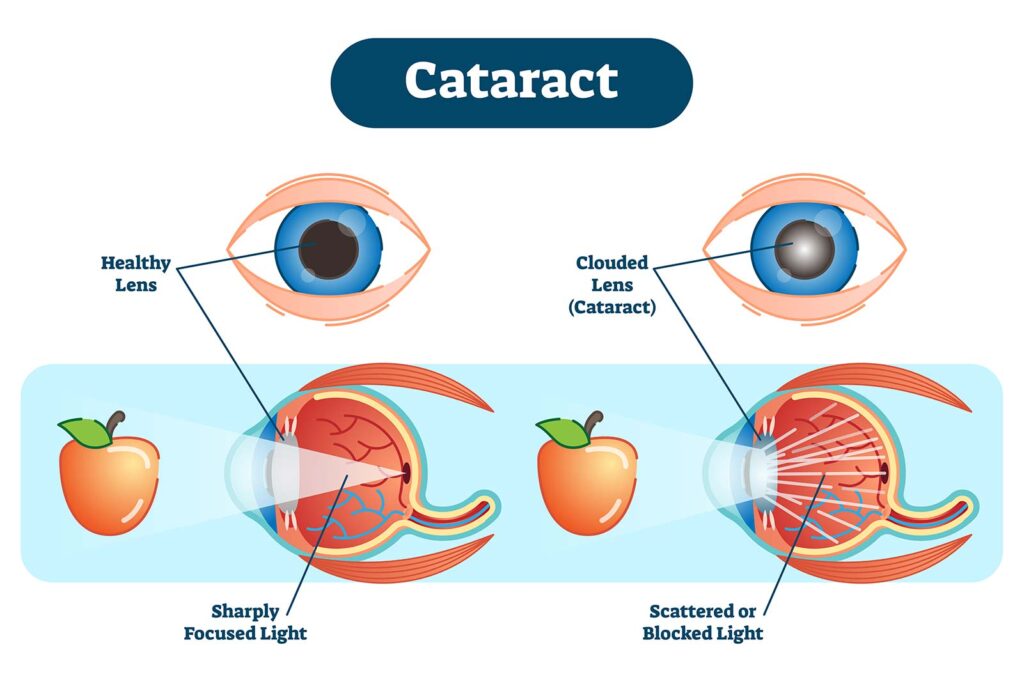

Why does Cataract Occur?
Ageing is a common cause of cataracts. As part of the natural ageing process, the proteins in the lens become altered leading to opacification. At a younger age, it may occur due to injuries, diseases like Diabetes, hypothyroidism, inflammation, radiation, and medications like steroids. It can also occur in children and be congenital & hereditary.
Now if you want to have a detailed look into Assessing the Need for Cataract Surgery: When is the Right Time?Here is the Blog, which will be a complete guide for you.
Who is at risk for developing Cataract?
- People who are 65+ years of age
- Diabetics
- Prolonged Steroid users
- Eye Injuries- Blunt trauma, injury with sharp object
- Excessive exposure to UV light
- Smokers
- Radiation exposure
- Eye conditions like High Myopia & Uveitis
Common symptoms of Cataract
The commonest symptom is a progressive blurring of vision. The vision maybe more hazy in bright or low light. Altered perception of colours, glare & sensitivity to bright light, difficulty in night driving, seeing multiple images, frequent changes in the power of glasses are some of the other problems that occur. Cataract usually develops in both eyes, but maybe more in one eye.
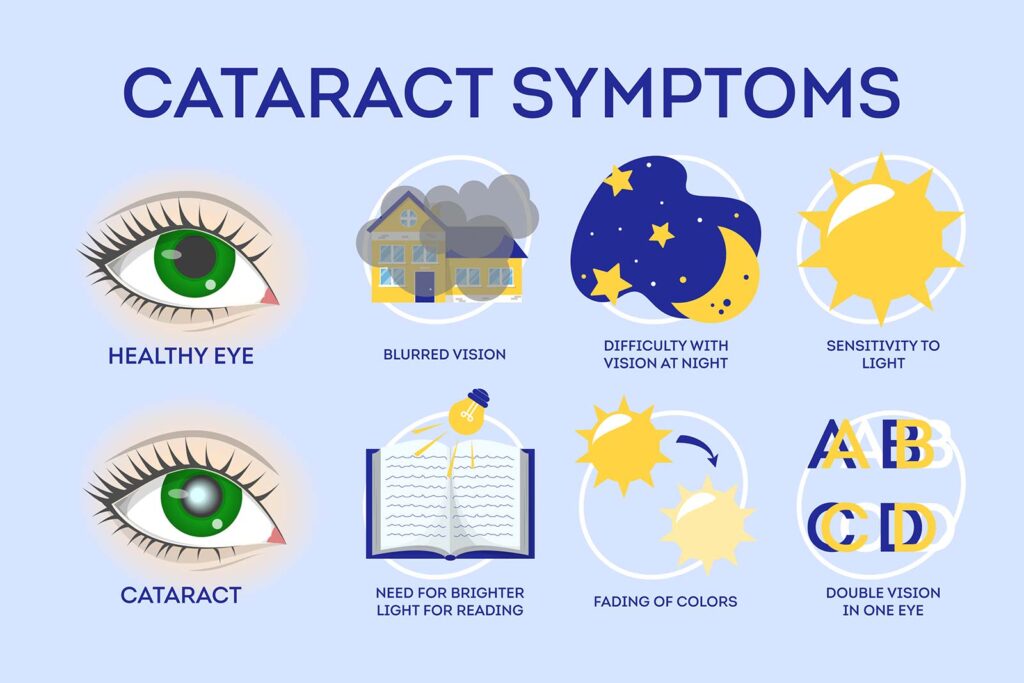
How can Cataract be treated?
Surgery is the only way to remove cataracts. There are no medications, eye drops or exercises that have proven to delay development or cause cataracts to disappear once they have formed. A healthy lifestyle may delay the onset of cataract. Glasses may temporarily help to improve vision, but the only definitive cure is surgery. Cataract cannot be treated by laser alone, a surgical incision is required.
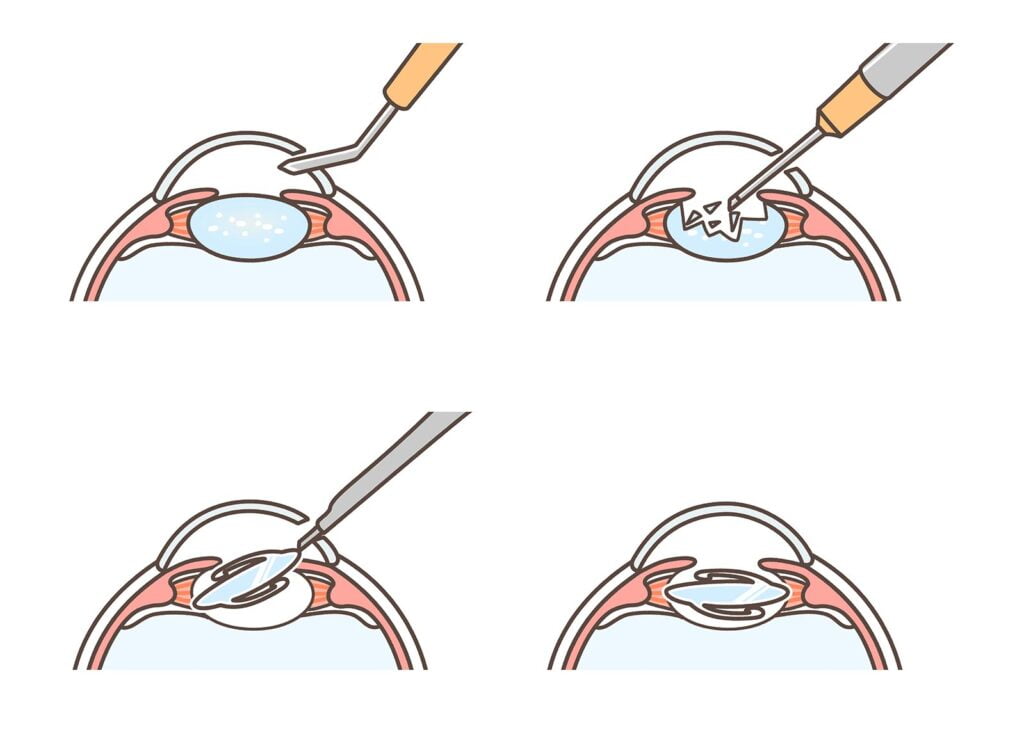
Is Cataract surgery safe?
Yes, cataract surgery with intraocular implant is an extremely safe procedure. It is a daycare procedure taking just around half an hour. If you have cataract in both eyes, then one is operated at a time with a gap of a few days. A small incision is made in the eye through which the lens is removed and replaced with a permanent artificial lens. There are many different techniques used though the gold standard is Phacoemulsification.
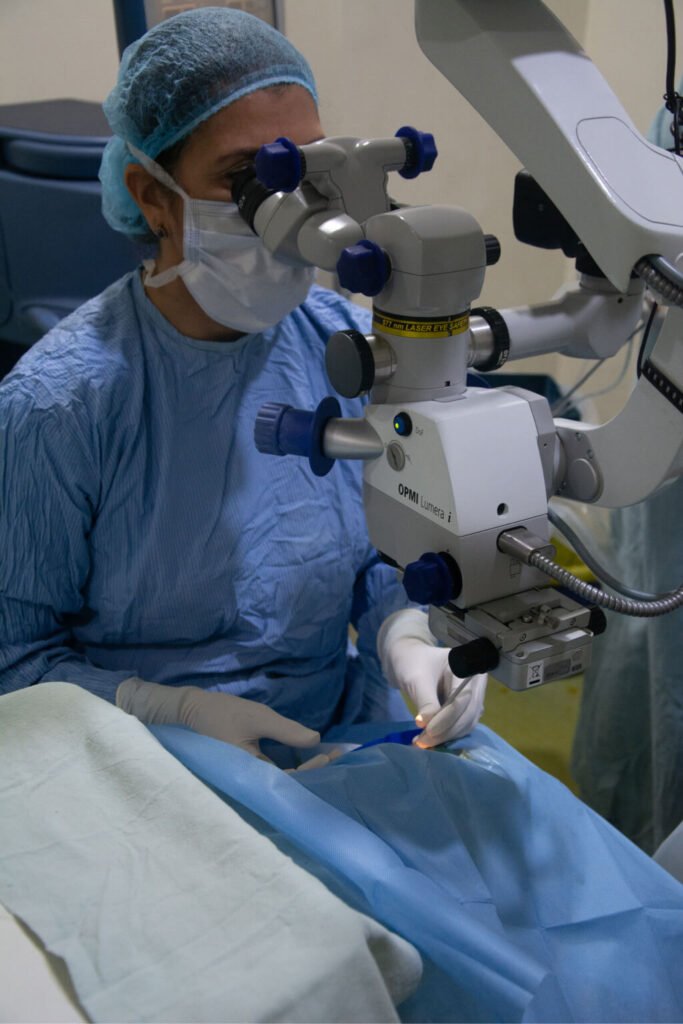
Usually cataract surgery is advised when it interferes with your daily activities and your quality of vision reduces. For each person this may differ depending on their visual need. When you come to Vision Plus Eye Centre for an opinion, our doctors will first do a thorough check up and then discuss the options with you. If your vision with glasses improves and meets your needs, surgery may be delayed. However, postponing it for too long is not advisable as once the cataract matures and becomes hard, surgery becomes more challenging and necessitates special techniques.
Conventional surgery required a large incision of 10-12mm. The cataract is removed in one piece and replaced with a rigid IOL. Multiple stitches are applied and it takes upto 8-12 weeks before the final number of glasses is given as healing takes longer. This technique is rarely used nowadays.
After making a conjunctival flap, a 6-8mm scleral incision is made with a blade and the cataract is then removed manually. A foldable or rigid IOL is then placed and one or more sutures may be required to close the wound. This can increase the astigmatism and takes at least 4 weeks before the power stabilizes.
Phacoemulsification (PHACO) is the latest stitchless, bloodless, painless procedure where high frequency ultrasound waves are used to emulsify the lens and suck out through a small incision of less than 3.2mm. A foldable IOL is then injected. With the latest advances, we now have Micro Phaco- Microincision Cataract surgery (MICS) where the incision size is even smaller around 2.2mm thus giving better results with lesser astigmatism.
1. Stitch-less, painless, bloodless, daycare procedure
2. Small incision, early healing, faster recovery
3. No injection needed
4. Early visual rehabilitation- can soon resume normal activities
5. Reduced dependency on glasses, less astigmatism
6. Yields a stronger eye which is more resistant to injuries
7. Less inflammation after surgery
Usually cataract surgery is advised when it interferes with your daily activities and your quality of vision reduces. For each person this may differ depending on their visual need. When you come to Vision Plus Eye Centre for an opinion, our doctors will first do a thorough check up and then discuss the options with you. If your vision with glasses improves and meets your needs, surgery may be delayed. However, postponing it for too long is not advisable as once the cataract matures and becomes hard, surgery becomes more challenging and necessitates special techniques.
There are 2 basic steps in cataract surgery. First is removal of the natural lens and second is replacement by an artificial/ intraocular lens(IOL). Rarely your surgeon may decide not to put an IOL at the time of cataract surgery if there is inadequate support or your eye condition is not suitable. In that case glasses or contact lenses may be advised.
Conventional surgery required a large incision of 10-12mm. The cataract is removed in one piece and replaced with a rigid IOL. Multiple stitches are applied and it takes upto 8-12 weeks before the final number of glasses is given as healing takes longer. This technique is rarely used nowadays.
After making a conjunctival flap, a 6-8mm scleral incision is made with a blade and the cataract is then removed manually. A foldable or rigid IOL is then placed and one or more sutures may be required to close the wound. This can increase the astigmatism and takes at least 4 weeks before the power stabilizes.
Phacoemulsification (PHACO) is the latest stitchless, bloodless, painless procedure where high frequency ultrasound waves are used to emulsify the lens and suck out through a small incision of less than 3.2mm. A foldable IOL is then injected. With the latest advances, we now have Micro Phaco- Microincision Cataract surgery (MICS) where the incision size is even smaller around 2.2mm thus giving better results with lesser astigmatism.
1. Stitch-less, painless, bloodless, daycare procedure
2. Small incision, early healing, faster recovery
3. No injection needed
4. Early visual rehabilitation- can soon resume normal activities
5. Reduced dependency on glasses, less astigmatism
6. Yields a stronger eye which is more resistant to injuries
7. Less inflammation after surgery
Premium IOLs
Yes, cataract surgery with intraocular implant is an extremely safe procedure. It is a daycare procedure taking just around half an hour. If you have cataract in both eyes, then one is operated at a time with a gap of a few days. A small incision is made in the eye through which the lens is removed and replaced with a permanent artificial lens. There are many different techniques used though the gold standard is Phacoemulsification.
Read Blog: https://visionplus.net.in/2023/08/17/exploring-intraocular-lens-options-for-enhanced-vision-after-cataract-surgery/
Aspheric/ Aberration free lenses:
They give better contrast, sharpness and clarity than regular monofocal lenses.
Preloaded IOLs:
These are prepackaged and are injected by a no touch technique
Toric lenses:
They are advisable in patients who have significant astigmatism. They also correct the cylindrical power making the vision sharper. Almost 30% of patients undergoing cataract surgery have significant astigmatism and can benefit from toric IOLs. They can be monofocal or multifocal.
Multifocal lenses: :
They are specially designed to correct near, intermediate and distance vision so that the dependency on glasses is greatly reduced. Monofocal lenses have a fixed power, so work best only at a particular distance. Multifocal lenses can be Bifocal or Trifocal. They have rings with different foci for different distances. They sometimes cause a drop in contrast sensitivity and night vision glare and halos.
Extended depth of Focus lenses (EDOF):
These are designed to give a more natural continuous range of vision especially for distance and intermediate vision. For very fine near work glasses may be required. They are free from night vision distortion
Comparison of IOLs
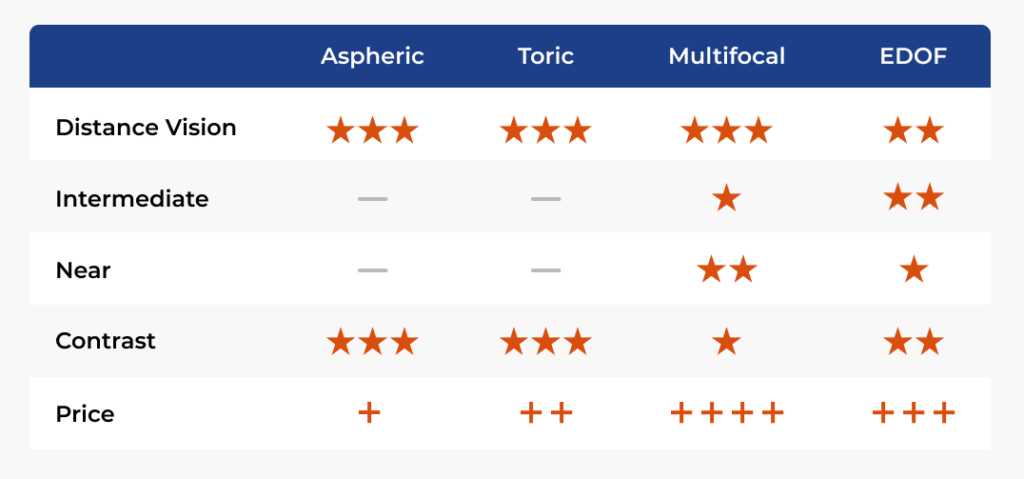
FAQs
The IOL is customised for each patient’s eye. Biometry test is done preoperatively to calculate the exact power and type of lens. At Vision Plus Eye Centre we have the highly sophisticated Lenstar Optical Biometer from Haag Streit USA
1. Non Foldable lenses – These require a large incision, are made PMMA
2. Foldable lenses – They go through a small incision < 3.2 mm, are made of hydrophilic or hydrophobic acrylic material
Cataract surgery is very affordable at Vision Plus Eye Centre. We have a range of packages to suit individual needs. We maintain the same high quality for all our patients. We offer cashless mediclaim and are empaneled with most insurance companies and also on the panel of CGHS, ECHS, DGEHS and several PSUs. Our TPA department will assist you to make the process easy.
Our Cataract surgery packages range from Rs. 18,000-95,000. For an exact estimate, fill out this form.

